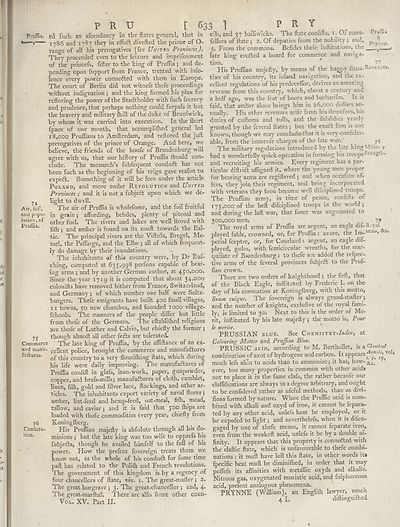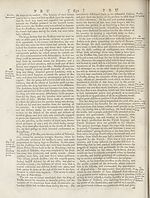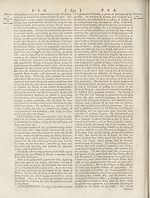Encyclopaedia Britannica > Volume 15, PLA-RAM
(701) Page 633
Download files
Complete book:
Individual page:
Thumbnail gallery: Grid view | List view

Pruflia.
74
Air, foil,
end p >pu-
lation, of
PruiSa,
7S
Commerce
and manu-
fadlures.
?6
Conlhtu-
tion.
P R U [ 63
ed fucli an afcendancy in the ftates general, that in
1786 and 1787 they in effett divefted the prince of O-
range of all his prerogatives (fee United Provinces).
They proceeded even to the feizure and imprifonment
of the princefs, filter to the king of Pruflia; and de¬
pending upon fupport from France, treated with info-
lence every power connefted with them in Europe.
The court of Berlin did not witnefs thefe proceedings
without indignation ; and the king formed his plan for
reftoring the power of the Stadtholder with fuch fecrecy
and prudence, that perhaps nothing could furpafs it but
the bravery and military fltill of the duke of Brunfwick,
by whom it was carried into execution. In the Ihort
fpace of one month, that accomplifhed general led
18,000 Pruflians to Amfterdam, and reftored the juft
prerogatives of the prince of Orange. And here, we
believe, the friends of the houfe of Brandenburg will
agree with us, that our hiftory of Pruflia thould con¬
clude. The monarch’s fubfequent conduft has not
been fuch as the beginning of his reign gave reafon to
expeft. Something of it will be feen under the article
Poland, and more under Revolution and United
Provinces ; and it is not a fubjeft upon which we de¬
light to dwell.
The air of Pruflia is wholefome, and the foil fruitful
in grain; affording, belides, plenty of pitcoal and
other fuel. The rivers and lakes are well ftored with
filh ; and amber is found on its coaft towards the Bal¬
tic. The principal rivers are the Viftula, Bregel, Me-
mel, the Paffarge, and the Elbe ; all of which frequent¬
ly do damage by their inundations.
The inhabitants of this country were, by Dr Euf-
ching, computed at 635,998 perfons capable of bear¬
ing arms ; and by another German author, at 450,000.
Since the year 1719 it is computed that about 34,000
colonifts have removed hither from France, Switzerland,
and Germany ; of which number one half were Saltz-
burgers. Thefe emigrants have built 400 fmall villages,
11 towns, 50 new churches, and founded 1000 village-
fchools. The manners of the people differ but little
from thofe of the Germans. The eftablifhed religions
are thofe of Luther and Calvin, but chiefly the former $
though almoft all other fefts are tolerated.
The late king of Pruflia, by the afliftance of an ex¬
cellent police, brought the commerce and manufadtures
of this country to a very flouriftiing ftate, which during
his life were daily improving. The manufadlures of
Pruflia confift in glafs, iron-work, paper, gunpowder,
copper, and brafs-mills; manufadlures of cloth, camblet,
linen, filk, gold and fxlver lace, ftockings, and other ar¬
ticles. The inhabitants export variety of naval ftores ;
amber, lint-feed and hemp-feed, oat-meal, fifli, mead,
tallow, and caviar; and it is faid that 500 ftiips are
loaded with thofe commodities every year, chiefly from
Koninglberg.
His Prufiian majefty is abfolute through all his do¬
minions ; but the late king was too wife to opprefs his
fubjecls, though he availed himfelf to the full of his
power. How the prefent fovereign treats them we
know not, as the whole of his condudb for fome time
paft has related to the Polifli and French revolutions.
The government of this kingdom is by a regency of
four chancellors of ftate, viz. 1. The great-mafter; 2.
The great burgrave ; 3. The great-chancellor ; and, 4.
The great-marfhal. There are alfo fome other coun-
Vol. XV. Part II.
3 1 PRY
cils, and 37 bailiwicks. The ftate conflfts, 1. Of conn- Ir-* -*
fellors of ftatc ; 2. Of deputies from the nobility ; and, p ' ,,e
3. From the commons. Befides thefe inftitutions, the
late king erefted a board for commerce and naviga¬
tion. 77
FI is Prufiian majefty, by means of the happy fltua- Revcrv-es.
tion of his country, its inland navigation, and the ex¬
cellent regulations of his predeceflbr, derives an amazing
revenue from this country, which, about a century and
a half ago, was the feat of boors and barbarifm. It is
faid, that amber alone brings him in 26,000 dollars an¬
nually. His other revenues arife from his demefnes, his
duties of culloms and tolls, and the fubftdies yearly
granted by the feveral ftates; but the exadh fum is not
known, though we may conclude that it is very confider-
able, from the immenfe charges of the late war. 73
The military regulations introduced by the late king VTilita^y
had a wonderfully quick operation in forming his troops* I'-ngth*
and recruiting his annies. Every regiment has a par¬
ticular diftridf afligned it, where the young men proper
for bearing arms are regiftered ; and when occalion of¬
fers, they join theii regiment, and being incorporated
with veterans they foon become well difciplined troops.
The Prufiian army, in time of peace, conflfts or
175,000 of the bell difciplined troops in the world;
and during the laft war, that force was augmented to
300,000 men. , T)
The royal arms of Pruflia are argent, an eagle dif-R yal
played fable, crowned, or, for Pruflia: azure, the Im-armt»
perial feeptre, or, for Courland: argent, an eagle dif-
playcd, gules, with femicircular wreaths, for the mar-
quifate of Brandenburg: to thefe are added the refpec-
tive arms of the feveral provinces fubjeft to the Pruf-
fian crown.
There are two orders of knighthood ; the firft, that
of the Black Eagle, inftituted by Frederic I. on the
day of his coronation at Koningfberg, with this motto,
Suuin cuique. The fovereign is always grand-mafter ;
and the number of knights, excluflve of the royal fami¬
ly, is limited to 30: Next to this is the order of Me¬
rit, inftituted by his late majefty; the motto is, Pour
le mente.
PRUSSIAN blue. See Chemistry-Z/i^, at
Colouring Mutter and Prujfian Blue.
PRUSSIC ACID, according to M. Berthollet, is Chemical
combination of azot of hydrogene and carbon. It appears. ^ ’ 0 '
much lefs akin to acids than to ammoniac; it has, how- &cj
ever, too many properties in common with other acids
not to place it in the fame clafs, the rather becaufe our
clafiifications are always in a degree arbitrary, and ought
to be confidered rather as ufeful methods, than as divi-
flons formed by nature. When the Pruflic acid is com¬
bined with alkali and oxyd of iron, it cannot be fepara-
ted by any other acid, unlefs heat be employed, or it
be expofed to light; and neverthelefs, when it is dilen-
gaged by one of thefe means, it cannot feparate iron,
even from the weakeft acid, unlefs it be by a double af¬
finity. It appears that this property is connected with
the elaftic ftate, which is unfavourable to thefe combi¬
nations : it muft have loft this ftate, in other words its
fpecific heat muft be dimmifhed, in order that it may
poffefs its afftnities with metallic oxyds and alkalis.
Nitrous gas, oxygenated muriatic acid, and fulphureous
acid, prefent analogous phenomena.
PRYNNE (William), an Englilh lawyer, much
4 L diftinguifhed
74
Air, foil,
end p >pu-
lation, of
PruiSa,
7S
Commerce
and manu-
fadlures.
?6
Conlhtu-
tion.
P R U [ 63
ed fucli an afcendancy in the ftates general, that in
1786 and 1787 they in effett divefted the prince of O-
range of all his prerogatives (fee United Provinces).
They proceeded even to the feizure and imprifonment
of the princefs, filter to the king of Pruflia; and de¬
pending upon fupport from France, treated with info-
lence every power connefted with them in Europe.
The court of Berlin did not witnefs thefe proceedings
without indignation ; and the king formed his plan for
reftoring the power of the Stadtholder with fuch fecrecy
and prudence, that perhaps nothing could furpafs it but
the bravery and military fltill of the duke of Brunfwick,
by whom it was carried into execution. In the Ihort
fpace of one month, that accomplifhed general led
18,000 Pruflians to Amfterdam, and reftored the juft
prerogatives of the prince of Orange. And here, we
believe, the friends of the houfe of Brandenburg will
agree with us, that our hiftory of Pruflia thould con¬
clude. The monarch’s fubfequent conduft has not
been fuch as the beginning of his reign gave reafon to
expeft. Something of it will be feen under the article
Poland, and more under Revolution and United
Provinces ; and it is not a fubjeft upon which we de¬
light to dwell.
The air of Pruflia is wholefome, and the foil fruitful
in grain; affording, belides, plenty of pitcoal and
other fuel. The rivers and lakes are well ftored with
filh ; and amber is found on its coaft towards the Bal¬
tic. The principal rivers are the Viftula, Bregel, Me-
mel, the Paffarge, and the Elbe ; all of which frequent¬
ly do damage by their inundations.
The inhabitants of this country were, by Dr Euf-
ching, computed at 635,998 perfons capable of bear¬
ing arms ; and by another German author, at 450,000.
Since the year 1719 it is computed that about 34,000
colonifts have removed hither from France, Switzerland,
and Germany ; of which number one half were Saltz-
burgers. Thefe emigrants have built 400 fmall villages,
11 towns, 50 new churches, and founded 1000 village-
fchools. The manners of the people differ but little
from thofe of the Germans. The eftablifhed religions
are thofe of Luther and Calvin, but chiefly the former $
though almoft all other fefts are tolerated.
The late king of Pruflia, by the afliftance of an ex¬
cellent police, brought the commerce and manufadtures
of this country to a very flouriftiing ftate, which during
his life were daily improving. The manufadlures of
Pruflia confift in glafs, iron-work, paper, gunpowder,
copper, and brafs-mills; manufadlures of cloth, camblet,
linen, filk, gold and fxlver lace, ftockings, and other ar¬
ticles. The inhabitants export variety of naval ftores ;
amber, lint-feed and hemp-feed, oat-meal, fifli, mead,
tallow, and caviar; and it is faid that 500 ftiips are
loaded with thofe commodities every year, chiefly from
Koninglberg.
His Prufiian majefty is abfolute through all his do¬
minions ; but the late king was too wife to opprefs his
fubjecls, though he availed himfelf to the full of his
power. How the prefent fovereign treats them we
know not, as the whole of his condudb for fome time
paft has related to the Polifli and French revolutions.
The government of this kingdom is by a regency of
four chancellors of ftate, viz. 1. The great-mafter; 2.
The great burgrave ; 3. The great-chancellor ; and, 4.
The great-marfhal. There are alfo fome other coun-
Vol. XV. Part II.
3 1 PRY
cils, and 37 bailiwicks. The ftate conflfts, 1. Of conn- Ir-* -*
fellors of ftatc ; 2. Of deputies from the nobility ; and, p ' ,,e
3. From the commons. Befides thefe inftitutions, the
late king erefted a board for commerce and naviga¬
tion. 77
FI is Prufiian majefty, by means of the happy fltua- Revcrv-es.
tion of his country, its inland navigation, and the ex¬
cellent regulations of his predeceflbr, derives an amazing
revenue from this country, which, about a century and
a half ago, was the feat of boors and barbarifm. It is
faid, that amber alone brings him in 26,000 dollars an¬
nually. His other revenues arife from his demefnes, his
duties of culloms and tolls, and the fubftdies yearly
granted by the feveral ftates; but the exadh fum is not
known, though we may conclude that it is very confider-
able, from the immenfe charges of the late war. 73
The military regulations introduced by the late king VTilita^y
had a wonderfully quick operation in forming his troops* I'-ngth*
and recruiting his annies. Every regiment has a par¬
ticular diftridf afligned it, where the young men proper
for bearing arms are regiftered ; and when occalion of¬
fers, they join theii regiment, and being incorporated
with veterans they foon become well difciplined troops.
The Prufiian army, in time of peace, conflfts or
175,000 of the bell difciplined troops in the world;
and during the laft war, that force was augmented to
300,000 men. , T)
The royal arms of Pruflia are argent, an eagle dif-R yal
played fable, crowned, or, for Pruflia: azure, the Im-armt»
perial feeptre, or, for Courland: argent, an eagle dif-
playcd, gules, with femicircular wreaths, for the mar-
quifate of Brandenburg: to thefe are added the refpec-
tive arms of the feveral provinces fubjeft to the Pruf-
fian crown.
There are two orders of knighthood ; the firft, that
of the Black Eagle, inftituted by Frederic I. on the
day of his coronation at Koningfberg, with this motto,
Suuin cuique. The fovereign is always grand-mafter ;
and the number of knights, excluflve of the royal fami¬
ly, is limited to 30: Next to this is the order of Me¬
rit, inftituted by his late majefty; the motto is, Pour
le mente.
PRUSSIAN blue. See Chemistry-Z/i^, at
Colouring Mutter and Prujfian Blue.
PRUSSIC ACID, according to M. Berthollet, is Chemical
combination of azot of hydrogene and carbon. It appears. ^ ’ 0 '
much lefs akin to acids than to ammoniac; it has, how- &cj
ever, too many properties in common with other acids
not to place it in the fame clafs, the rather becaufe our
clafiifications are always in a degree arbitrary, and ought
to be confidered rather as ufeful methods, than as divi-
flons formed by nature. When the Pruflic acid is com¬
bined with alkali and oxyd of iron, it cannot be fepara-
ted by any other acid, unlefs heat be employed, or it
be expofed to light; and neverthelefs, when it is dilen-
gaged by one of thefe means, it cannot feparate iron,
even from the weakeft acid, unlefs it be by a double af¬
finity. It appears that this property is connected with
the elaftic ftate, which is unfavourable to thefe combi¬
nations : it muft have loft this ftate, in other words its
fpecific heat muft be dimmifhed, in order that it may
poffefs its afftnities with metallic oxyds and alkalis.
Nitrous gas, oxygenated muriatic acid, and fulphureous
acid, prefent analogous phenomena.
PRYNNE (William), an Englilh lawyer, much
4 L diftinguifhed
Set display mode to:
![]() Universal Viewer |
Universal Viewer | ![]() Mirador |
Large image | Transcription
Mirador |
Large image | Transcription
Images and transcriptions on this page, including medium image downloads, may be used under the Creative Commons Attribution 4.0 International Licence unless otherwise stated. ![]()
| Encyclopaedia Britannica > Encyclopaedia Britannica > Volume 15, PLA-RAM > (701) Page 633 |
|---|
| Permanent URL | https://digital.nls.uk/191909889 |
|---|
| Attribution and copyright: |
|
|---|
| Description | Ten editions of 'Encyclopaedia Britannica', issued from 1768-1903, in 231 volumes. Originally issued in 100 weekly parts (3 volumes) between 1768 and 1771 by publishers: Colin Macfarquhar and Andrew Bell (Edinburgh); editor: William Smellie: engraver: Andrew Bell. Expanded editions in the 19th century featured more volumes and contributions from leading experts in their fields. Managed and published in Edinburgh up to the 9th edition (25 volumes, from 1875-1889); the 10th edition (1902-1903) re-issued the 9th edition, with 11 supplementary volumes. |
|---|---|
| Additional NLS resources: |
|

